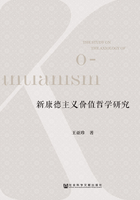
Abstract
How is absolute value possible——The study on the axiology of neo-Kantianism
In the middle of the nineteenth century, under the covering attack from identity crisis of philosophy and spiritual crisis humankind, value issues gradually became the central problem of philosophy research. Meanwhile, relativism was submerging; thinkers abandoned themselves to the ever-changing history, forgetting the existence of the absolute. Thereupon, it became the consensus of many philosophers in that time that they should pursue the absolute value to overcome relativism. This dissertation is devoted to deeply study the value issues of neo-Kantianism, beginning with the relationship between absolute and relative.
Windelband and Richert, as the leaders of Freiburg school of neoKantianism, are the important founders of axiology. Researching their thoughts on value and analyzing their limitations, not only might be of significance to the propulsion of researching value philosophy and Marxism Philosophy, but also have the important practical significance for us to think the value issues of the present society. Particularly, the appeal for absolute value of neo-Kantianism no doubt has the important revelatory significance to today's pluralistic society.
This dissertation has six parts: Introduction, four chapters and concluding remarks.
The introduction discusses the meaning and the value of this topic, present researches and the outline of this dissertation.
Chapter one discusses the historical backgrounds of the absolute value theory of neo-Kantianism. By tracing back, it is found that the scope of philosophy research has been carved up by specialized sciences, getting smaller and smaller and facing unprecedented identity crisis. Meanwhile, profit paramountcy and individualism paramountcy presented in the whole European world, which led to spiritual crisis just under the backgrounds of philosophical identity crisis and spiritual crisis, philosopher of neo-Kantianism began to construct their absolute value theory. Kant, Lotze and Nietzsche have played an irreplaceable role in Basic molding of the theory.
Chapter two dicusses the absolute value theory of Windelband from three aspects: the object of philosophy research, the definition of value and the whole construction of the absolute value. Windelband claimed that the object of philosophy varied with times, and value issues had became the core topic of philosophy research by the end of 19th century. However, the value research before neo-Kantianism presented the tendency of relativism, so the only way to overcome the relativism is to pursuit absolute value. Thus, universally effective value became the object of philosophy research. After criticizing psychologism, empiricism and historicism, Windelband defined value as logical, transcendental and absolutely objective. Finally, Windelband discussed the construction of absolute value from four aspects, that is logical value, ethical value, aesthetic value and religious value.
Chapter three discusses the absolute value theory of Richert from three aspects, that is criticizing two kinds of philosophy(life philosophy and historicism), the formation of historical conception and the presentation of absolute value, and the distinction between value and evaluation. Firstly, the conception of value of Richert's, which claims value is intelligential, formal and transcendental, will be gradually unambiguous by means of criticizing life philosophy and historicism. Secondly, reality is irrational, if we want turn irrational into rational, which means conception forming, we need some choice principles; therefore, value is the basis of the formation of historical conception. Value is attached to cultural object and the objectivity of value is depended on its effectiveness. Finally, value is different from the evaluation, value is theoretical and absolute, and evaluation is practical and relative.
Chapter four mainly discusses the comments on the absolute value theory of Windelband and Richert from their contemporary philosophers, especially from Dilthey, Heidegger and Lukacs. This part will also make a comparison between the absolute value theory of Windelband and Richert and some other philosophers'views on value, such as Scheler, the master of transcendental value theory, Perry who proposes empirical value theory, Moore insists on intuitionism value theory, Ayer who claims emotionalism value theory, and Stevenson. Their attitude and relationship toward absolute value, and the ways of their argument will be analyzed, then their advantages and disadvantages will be revealed.
The concluding remarks give a general evaluation on absolute value theory of neo-Kantianism, analyses the value and limitation of the absolute value theory of neo-Kantianism.
Key Words: Windelband; Richert; Value; Relative; Absolute